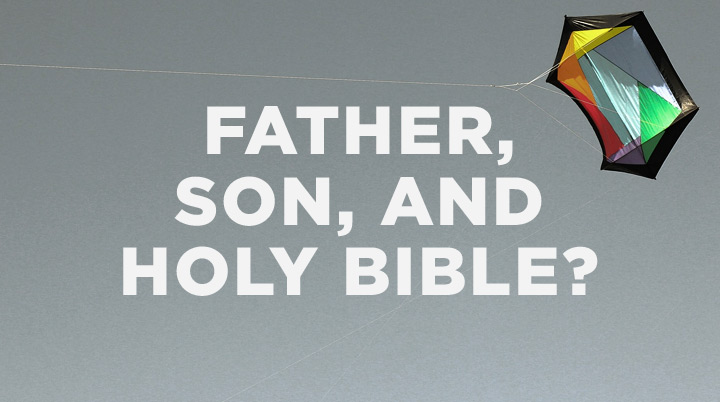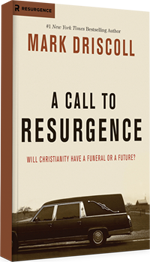Latest
-
Objections to the Christian Faith from the Unchurched and De-Churched
 Tue Dec 02, 2014
Tue Dec 02, 2014
by Resurgence -
Craig Groeschel: We Innovate for Jesus
 Tue Oct 14, 2014
Tue Oct 14, 2014
by Resurgence -
Mark Driscoll: Revelation
 Tue Oct 07, 2014
Tue Oct 07, 2014
by Resurgence -
RESURGENCE LEADERSHIP #034: JOHN PIPER, WHY I TRUST THE SCRIPTURES, PART 2
 Tue Sep 30, 2014
Tue Sep 30, 2014
by Resurgence -
Resurgence Leadership #033: John Piper, Why I Trust the Scriptures, Part 1
 Tue Sep 23, 2014
Tue Sep 23, 2014
by Resurgence

Archives
Is the Trinity Father, Son, and Holy Bible?

This week I am in the land of fruits and nuts—sunny California—for Act Like Men in Long Beach. Rumor has it there is a conference not far away dealing with the person and work of the Holy Spirit.
Oddly enough, I talk about him in my forthcoming book A Call to Resurgence. Below is a section from that book that begins an entire chapter on the Holy Spirit. For those of you wanting a copy, I will be dropping off a few cases tomorrow if I can find some time and find that other conference. In the meantime, here’s how the chapter, “The Holy Spirit: Empowering the Church for Mission,” begins:
For Spring Break one year, I took my family to the beach. Unfortunately, it was a beach in Washington. We arrived at our rented cottage in time to enjoy rain that made me wonder if God had revoked his promise to Noah to never flood the earth again.
Finally, there was a very brief sun break. We got dressed in our wool hats, winter coats, and boots to enjoy an arctic walk on the beach. There was no sand on the beach—because it was all in my mouth and eyes.
What was most impressive was the gale-force wind. At one point I literally held on to our youngest child in fear that he would be blown over. Before long, we scurried back to our cottage to thaw out, play board games, and bemoan the fact that we did not live in Southern California. Since this was the first day of what was supposed to be an entire week’s vacation, things seemed hopeless.
Looking out the window some hours later, I came up with an idea that I thought might salvage our spring break: kites. I went to find a kite shop so we could try to use the weather to our advantage.
Thankfully, there was an epic kite store not far away. I bought some big, nice, serious kites—the kind that could handle a flight attendant on board. Eventually the rain stopped, so we went out for the maiden voyage of our kites.
I came up with an idea that I thought might salvage our spring break.
We’d never really flown kites much, and the younger kids were excited to see how they worked. I told them to hold the roll of string, letting out just a bit at a time. With the movie Up in my mind, I also told them that if the gale-force winds started to cause not only their kites but also their bodies to leave the ground, they needed to let go of the string.
What happened was amazing. The dead kites sprang to life. Filled by the wind, they were empowered. They began to soar and dance because of a power they did not possess in themselves. It was a beautiful sight and caused my youngest daughter to laugh and dance with joy.
The Christian life is supposed to be like that. When the Bible says that Jesus was filled with the Holy Spirit and that Jesus’ people are to be filled with the Holy Spirit, this is what is meant. But various tribes approach the Holy Spirit differently because each emphasizes a different aspect of his work.
What happened was amazing. The dead kites sprang to life.
In a cessationist tribe, the functional Trinity is sometimes the Father, Son, and Holy Bible: the Holy Spirit wrote the Scriptures through human authors, and then it’s like he’s been on vacation ever since. In a Pentecostal church, you know you have the Holy Spirit if you speak in tongues, the primary evidence to Pentecostals that a believer has the Spirit. In a prosperity tribe, the Holy Spirit’s ministry is largely to make you healthy and wealthy; he’s presented as the source of blessing to those who have faith.
In more fundamental tribes, the Holy Spirit has two primary ministries: to write the Bible and convict us of sin. Basically, you are a nail, the Bible is a hammer, and the Holy Spirit’s job is to pound you. In charismatic tribes, the fruit of the Spirit is emphasized: the Holy Spirit is the one who causes our character to become more like Jesus’ as we pray and worship passionately. In missional tribes, the gifts of the Spirit are emphasized, thereby helping believers discover the ministry God has for them as part of his mission.
Various tribes approach the Holy Spirit differently because each emphasizes a different aspect of his work.
In Reformed churches, you won’t hear a lot about the Spirit, as they tend to attribute much of his work to the gospel and the sovereignty of God. So when lives are changed, the explanation is that what happened was because of the gospel without much reference to the Spirit’s application of it. And when God works out circumstances to some favorable end, Calvinists are prone to attribute it to God’s sovereignty, while continuationists are prone to attribute it to God’s Spirit. Often it’s little more than a matter of semantics since the Spirit is the sovereign God.
Sadly, much of the debate and division among tribes is in regard to the person and work of the Holy Spirit. I am firmly convinced that for Christianity to have a future instead of a funeral, various tribes must strive to obey Ephesians 4:3, where Paul commands us to be “eager to maintain the unity of the Spirit.” The remainder of this chapter is dedicated to that end, as our unity in the Spirit requires agreement about the Spirit.
This post is adapted from A Call to Resurgence: Will Christianity Have a Funeral or a Future? by Mark Driscoll. Copyright © 2013.
